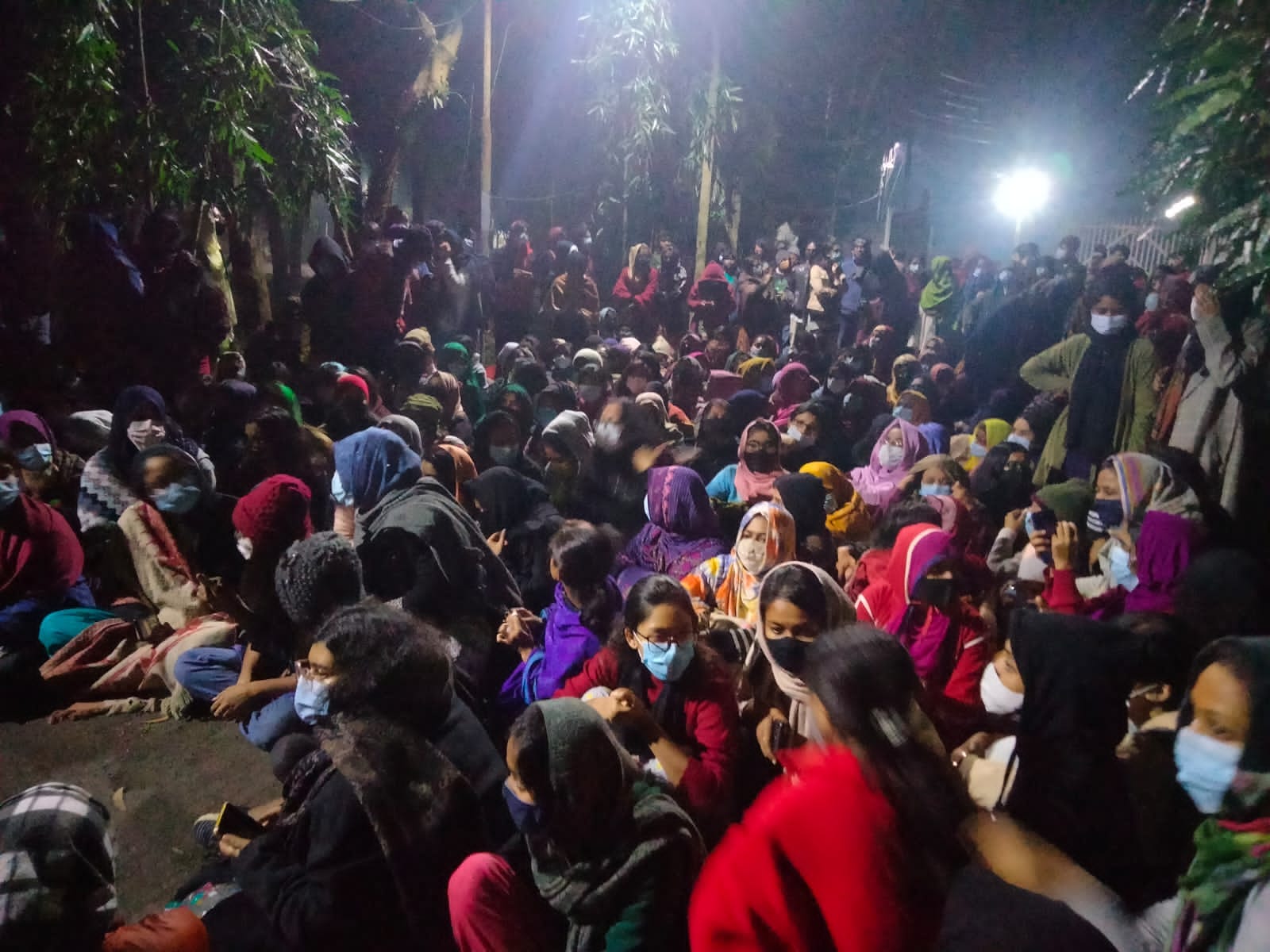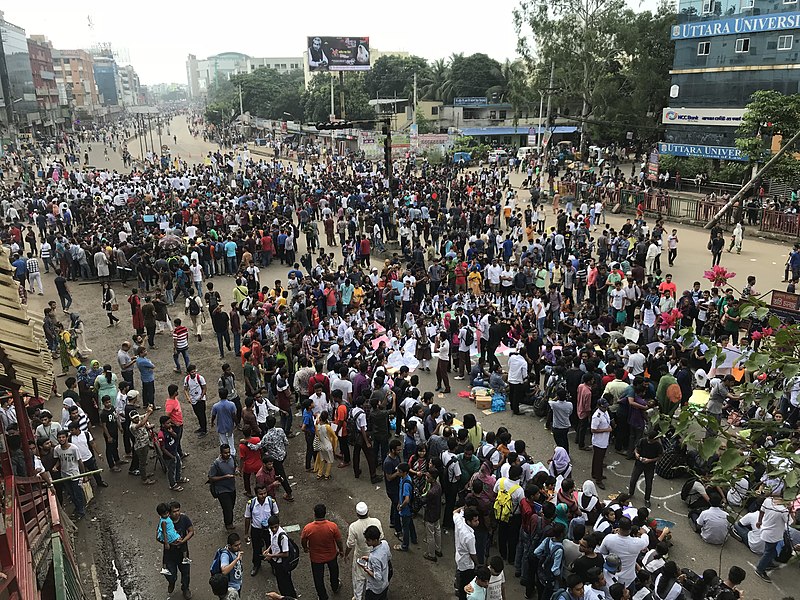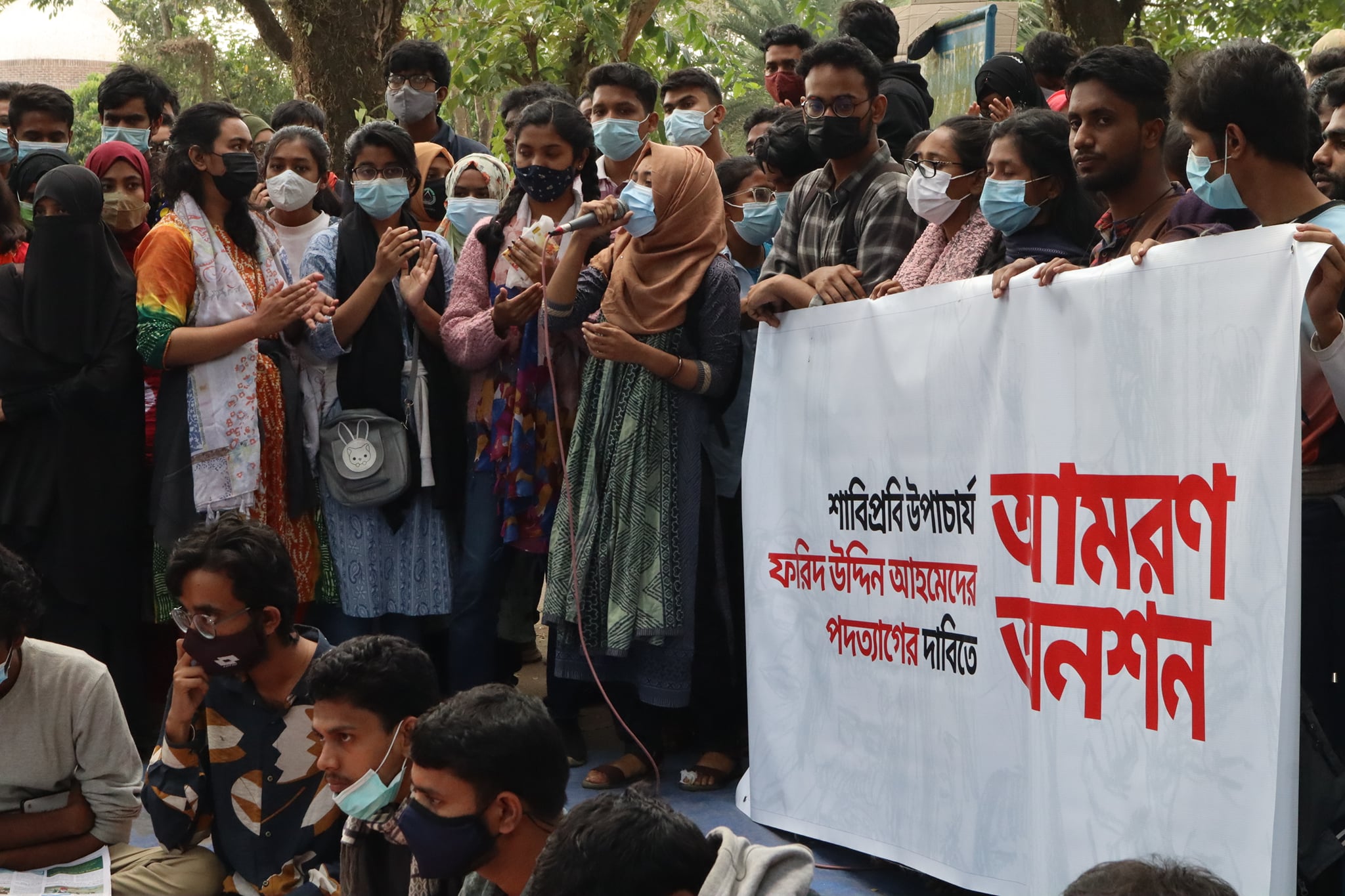Police and state authorities in Bangladesh have once again resorted to brutal repression. Allied with thugs like the Chhatra League, they unleashed an attack against protesting students at Shahjalal University of Science and Technology (SUST) in Sylhet. The students were protesting for basic demands and a representative body to look after their affairs in their hostel, but were met with police brutality unleashed by the university administration. The protesting students were beaten up on the campus, and attacked with stun grenades, tear gas and batons.
Videos of this state repression went viral across the country, leading to uproar from students nationally. There were solidarity protests in Rajshahi University in Dhaka, and many other locations. Nationwide, students used social media to express their anger, whilst also raising similar issues that they face in their own universities. Across the country, the situation is no different in educational institutions: students face fee hikes, callous administrations, goons using the guise of ‘student leaders’, and other repressive measures used to subjugate them and force them to accept unbearable living conditions on campus.
Wherever voices are raised against this injustice and tyranny, it is met with brutality by the authorities. As such, the movement at Shahjalal University in Sylhet is a thunderclap of the growing storm of hatred and anger felt among students against Bangladesh’s rotten ruling elite. Despite the police brutality, the students refused to bow down, and instead came out in huge numbers the following day, in protest at the repression, demanding the resignation of the Vice Chancellor (VC).
They also appealed to students across the country for messages of solidarity and protests in support of the SUST students, in order to wage a united struggle against the university management. They began chalking and graffiting walls with agitational slogans – a form of protest that had previously been banned. According to the latest reports, the students have now begun a hunger strike until the VC resigns.
The incident
The movement of students at SUST began on the evening of 13 January, following an alleged incident in which the dormitory provost of Begum Sirajunnesa Hall, Zafrin Ahmed Liza, allegedly “misbehaved” when approached by a student with grievances.
 Besides the provost's removal, the students demanded a student-friendly hall provost committee, and for the mismanagement by the sitting hall provost committee to be resolved / Image: শিক্ষার্থীবান্ধব শাবিপ্রবি চাই
Besides the provost's removal, the students demanded a student-friendly hall provost committee, and for the mismanagement by the sitting hall provost committee to be resolved / Image: শিক্ষার্থীবান্ধব শাবিপ্রবি চাই
Besides the provost's removal, the students demanded a student-friendly hall provost committee, and for the mismanagement by the sitting hall provost committee to be resolved.
The protesting students pursued the Vice Chancellor, Professor Farid Uddin Ahmed, to the Dr MA Wazed Mia ICT Bhaban (building), where they demonstrated for their demands. After midnight, Saturday 15 January, the students announced that they would indefinitely boycott the classes of all departments until all their demands were met.
Earlier that Saturday evening, repression was unleashed as protesting students were attacked by Bangladesh Chhatra League (BCL) leaders and activists – the BCL being the student wing of the ruling political party, the Awami League (AL).
And on 16 January, the protests were attacked by police. Tear gas, sound grenades, rubber bullets, and a baton charge were unleashed before the protest was finally dispersed.
Despite the violence against the students, on the night of Monday 17 January, the police filed a case against the SUST students themselves! The protesting students were charged with vandalism and attempted murder. It is quite clear, however, from the footage of the protests, that the police were the initiators of a vicious attack against the students.
On Monday 17 January, student protesters began a sit-in outside the Vice Chancellor’s residence, which escalated on 19 January into a hunger strike.
Alarmed at the escalation, the local AL leaders decided on a change of tack: on Tuesday 18 January, they came out to express solidarity with the students, whilst requesting the students give the SUST administration time to fulfil the demands in an effort to defuse the movement.
The students must not relent in their protests. The AL leaders and BCL, their reactionary student wing, are part of the establishment, which is responsible for the misery of the students. The police take orders from the government under the AL regime. And BCL are little more than the latter’s thugs. They act with impunity and are used as an auxiliary to the state security apparatus.
Empty messages of solidarity are just used to hide the hypocrisy of the AL and reduce damage done to the regime.
Lessons to be learned
This is not the first time we’ve seen the revolutionary potential of the students. We can recall the protests for road safety in 2018. Some ‘liberal’ voices call for the depoliticisation of Bangladeshi students but, as can be seen by the recent protests and the earlier protests for road safety, the students of Bangladesh can be an immensely progressive political force, and they have a long history of playing a revolutionary role in Bangladesh.
However, the students alone cannot overthrow the rotten AL regime. The workers of Bangladesh are the natural allies of the students. They too have suffered the same vicious attacks by the police, as in 2009 and 2010. We have seen how protests of textile workers have also been set upon by the BCL, the police, and the notorious Rapid Action Battalion (RAB) – a semi-legal, paramilitary state security force at the beck and call of the regime.
 The students of Bangladesh can be an immensely progressive political force, and they have a long history of playing a revolutionary role / Image: Asivechowdhury
The students of Bangladesh can be an immensely progressive political force, and they have a long history of playing a revolutionary role / Image: Asivechowdhury
And just as the workers are ruthlessly exploited by the capitalists, the students too suffer at the hands of a reckless administration that is more interested in keeping the system running than the safety of students and staff. Students are forced to live in halls in miserable conditions. They must sit exams despite the fact that cases of COVID-19 are soaring. Teachers are forced to teach in unsafe conditions.
Students must thus strive to build a united front with the workers against university management, and to link up their struggle with the wider labour movement. Rather than looking towards ministers, corrupt politicians and other so-called ‘influential’ individuals and groups, the students should look for support among the factory workers, rickshaw pullers, sanitation workers, and workers in the public sector.
It ought to be said that the hunger strikes have placed the students on a weak footing. What is required is a campaign of mass agitation in working-class areas.
The students must link up with the workers in a joint struggle to overthrow the regime that oppresses them both. But is getting rid of the AL sufficient to achieve the aims of these protest movements? When the Bangladesh Nationalist Party (BNP) was in power, things were no better than they are now under AL.
Ultimately, the economic system – the capitalist system – is to blame. The education system is run for profit and not in the interests of the students and workers.
The instrument which defends the capitalist system is the capitalist state.
In the final analysis, the capitalist state can be reduced to armed bodies that defend the property of the capitalists against the workers and students who want to change society for the benefit of all – as has been demonstrated by the protests of students and workers recently and in the more distant past. This is why the AL, the BCL, and the police, are all united in their violence and oppression of the workers and students of Bangladesh. There must be no illusions in the capitalist class and the armed enforcers of their oppressive rule.
“Imperialism – the era of bank capital, the era of gigantic capitalist monopolies, of the development of monopoly capitalism into state-monopoly capitalism – has clearly shown an unprecedented growth in its bureaucratic and military apparatus in connection with the intensification of repressive measures against the proletariat, both in the monarchical and in the freest, republican countries.” (Lenin, The State And Revolution)
The fight of the Bangladeshi students and workers must be for a society which is controlled by the working class, without whom society would cease to function. A society run by the workers and students would not put the interests of a parasitic few above the needs of the many. The fight of the Bangladeshi students and workers must be the fight for a socialist society - a society based on the principle of “From each according to their ability, to each according to their need”.
Which way forward for the student movement?
The Bangladeshi student movement – and for that matter, the Bangladeshi workers’ movement – is in need of ideological rearmament. Only the ideas of genuine Marxism – the ideas of Marx, Engels, Lenin, and Trotsky – can show the way forward to the successful overthrow of the capitalist system in Bangladesh.
But there are no shortcuts on the road to the socialist revolution. The students of Bangladesh can play an important role. They must be among the first to arm themselves with the ideas of revolutionary Marxism.
What is necessary is the construction of an organised student movement, drawing from the most advanced layer of class-conscious students across the country, based on the ideas of Marxism. All the existing organisations have failed in their purpose and students must shed their illusions in them.
“Without revolutionary theory there can be no revolutionary movement. This idea cannot be insisted upon too strongly at a time when the fashionable preaching of opportunism goes hand in hand with an infatuation for the narrowest forms of practical activity.” (Lenin, What Is To Be Done?)
- Students of Bangladesh! Move forward to a country-wide struggle for your rights!
- Solidarity with the protesting students of Shahjalal university!
- Forward to the unity of workers and students!
- End police brutality and state repression!
- Down with capitalism! Long live socialism!

